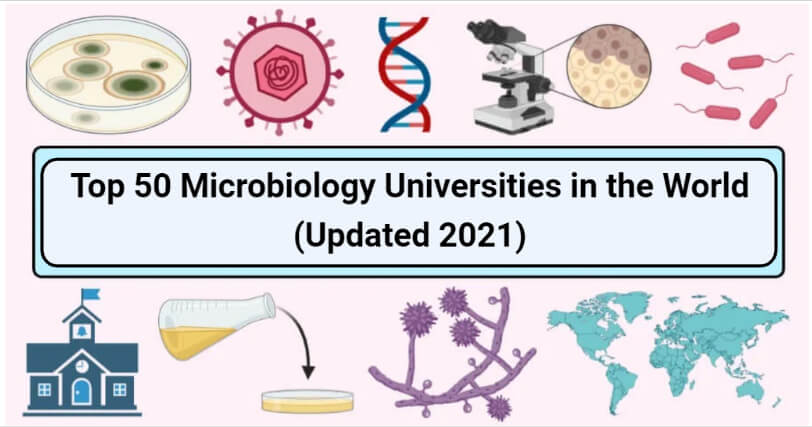Disclaimer: If there are any copyright issues regarding the name, logo, and information of the universities, please email us at microbenotes@gmail.com.
Ranking Source: U.S. News Best Global Universities
The subject fields used in the analysis came from subject schemas in Clarivate, which uses the content and citation indicators from the Web of Science. Publications are limited to those published between 2014 to 2018. However, the citations to those papers come from all publications, including the most recent data available.
Read Also- Top 10 Microbiology Journals with Impact Factor (Updated 2020)
Note: The same ranking means there is a tie in the subject score.
Table: Weights and factors used to compute the subject rankings (For Biology and Microbiology)
| S.N. | Ranking Factors | Ranking Weights |
| 1. | Global research reputation | 12.5% |
| 2. | Regional research reputation | 12.5% |
| 3. | Publications | 15% |
| 4. | Normalized citation impact | 10% |
| 5. | Total citations | 15% |
| 6. | Number of publications that are among the 10% most cited | 10% |
| 7. | Percentage of total publications that are among the 10% most cited | 5% |
| 8. | Number of highly cited papers that are among the top 1% most cited in their respective field | 5% |
| 9. | Percentage of total publications that are among the top 1% most highly cited papers | 5% |
| 10. | International collaboration – relative to the country | 5% |
| 11 | International collaboration | 5% |
| Total | 100% |
For the 2021 rankings, the cutoff date was May 28, 2020.
The microbiology category comprises studies dealing with the biology and biochemistry of protozoa and microorganisms. Covering topics that range from the medical implications of organisms known to cause diseases to the biotechnology applications of microorganisms for basic science and clinical use, publications within this category focus on the study of microscopic organisms.

1. Harvard University
Cambridge, MA 02138 United States
Subject Score- 100.0
2. Massachusetts Institute of Technology
77 Massachusetts Avenue, Cambridge, MA 02139 United States
Subject Score- 85.0
3. University of California, San Francisco
500 Parnassus Ave, San Francisco, CA 94143 United States
Subject Score- 79.0
4. University of Oxford
Wellington Square, Oxford OX1 2JD United Kingdom
Subject Score- 78.2
5. University of California, San Diego
9500 Gilman Drive, La Jolla, CA 92093 United States
Subject Score- 73.8
6. Cornell University
Ithaca, NY 14853 United States
Subject Score- 71.8
7. University of Pennsylvania
Philadelphia, PA 19104 United States
Subject Score- 71.5
8. University of Washington
Seattle, WA 98195 United States
Subject Score- 71.4
9. University of California, Berkeley
110 Sproul Hall, Berkeley, CA 94720-5800 United States
Subject Score- 69.5
9. Washington University in St. Louis
1 Brookings Drive, St. Louis, MO 63130 United States
Subject Score- 69.5
11. Imperial College London
Exhibition Road, London SW7 2AZ United Kingdom
Subject Score- 68.5
12. Duke University
Durham, NC 27708 United States
Subject Score- 68.3
13. Johns Hopkins University
3400 N. Charles Street, Baltimore, MD 21218 United States
Subject Score- 67.9
14. University of North Carolina, Chapel Hill
Chapel Hill, NC 27599 United States
Subject Score- 67.2
15. Stanford University
Stanford, CA 94305 United States
Subject Score- 66.5
16. Icahn School of Medicine at Mount Sinai
1428 Madison Ave, New York, NY 10029 United States
Subject Score- 66.0
16. University of Melbourne
1-100 Grattan St, Parkville, Victoria 3010 Australia
Subject Score- 66.0
18. University of Wisconsin, Madison
500 Lincoln Drive, Madison, WI 53706 United States
Subject Score- 65.5
19. University of Cambridge
Trinity Lane, Cambridge CB2 1TN United Kingdom
Subject Score- 64.4
20. Emory University
201 Dowman Drive, Atlanta, GA 30322 United States
Subject Score- 64.3
21. University of Chicago
5801 S. Ellis Avenue, Chicago, IL 60637 United States
Subject Score- 63.6
22. University of Copenhagen
Nørregade 10, Copenhagen 1165 Denmark
Subject Score- 61.8
23. Columbia University
2960 Broadway, New York, NY 10027 United States
Subject Score- 61.6
24. Universidade de São Paulo
Av. Prof. Almeida Prado, nº1280 – Butantã, São Paulo, São Paulo 05508-070 Brazil
Subject Score- 61.4
25. Yale University
New Haven, CT 06520 United States
Subject Score- 61.2
26. University of California–Los Angeles
405 Hilgard Avenue, Los Angeles, CA 90095 United States
Subject Score- 60.2
27. University of Queensland Australia
Brisbane, Queensland 4072 Australia
Subject Score- 58.8
28. Ghent University
Sint-Pietersnieuwstraat 25, Gent 9000 Belgium
Subject Score- 58.3
28. University of Edinburgh
Old College, South Bridge, Edinburgh, Scotland EH8 9YL United Kingdom
Subject Score- 58.3
30. Catholic University of Leuven
Oude Markt 13 – bus 5005, Leuven 3000 Belgium
Subject Score- 57.3
30. University of Hong Kong
Pok Ful Lam Road, Pok Fu Lam, Hong Kong Hong Kong
Subject Score- 57.3
32. Wageningen University and Research Center
Droevendaalsesteeg 4, Wageningen 6708 PB Netherlands
Subject Score- 56.7
33. University of Minnesota, Twin Cities
100 Church Street SE, Minneapolis, MN 55455-0213 United States
Subject Score- 56.4
34. National University of Singapore
21 Lower Kent Ridge Road, Singapore 119077 Singapore
Subject Score- 56.3
35. Utrecht University
P.O Box 80125, Utrecht 3508 TC Netherlands
Subject Score- 55.9
36. New York University
70 Washington Square S, New York, NY 10012 United States
Subject Score- 55.8
37. University of California, Davis
1 Shields Avenue, Davis, CA 95616 United States
Subject Score- 55.7
38. University of Tokyo
7-3-1 Hongo, Bunkyo-ku, Tokyo 113-0033 Japan
Subject Score- 55.4
39. University of Pittsburgh
4200 Fifth Avenue, Pittsburgh, PA 15260 United States
Subject Score- 54.4
39. University of Toronto
315 Bloor Street W, Toronto, Ontario M5S 2J7 Canada
Subject Score- 54.4
39. University of Zurich
Rämistrasse 71, Zürich CH-8006 Switzerland
Subject Score- 54.4
42. University of Glasgow
Gilmorehill Campus, Glasgow, Scotland G12 8QQ United Kingdom
Subject Score- 53.9
43. University of Georgia
Administration Building, Athens, GA 30602 United States
Subject Score- 53.8
43. University of Michigan, Ann Arbor
500 S. State St., Ann Arbor, MI 48109 United States
Subject Score- 53.8
45. University of Texas Medical Branch, Galveston
301 University Boulevard, Galveston, TX 77555 United States
Subject Score- 53.5
46. London School of Hygiene & Tropical Medicine
Keppel Street, London WC1E 7HT United Kingdom
Subject Score- 53.2
47. University of Aix-Marseille
58 Boulevard Charles Livon, Marseille 13284 France
Subject Score- 53.0
48. Ohio State University, Columbus
154 W. 12th Avenue, Columbus, OH 43210 United States
Subject Score- 52.9
49. Swiss Federal Institute of Technology Zurich
Rämistrasse 101, Zurich CH-8092 Switzerland
Subject Score- 52.7
50. Seoul National University
1 Gwanak-ro, Gwanak-gu, Seoul 151-742 South Korea
Subject Score- 51.8
